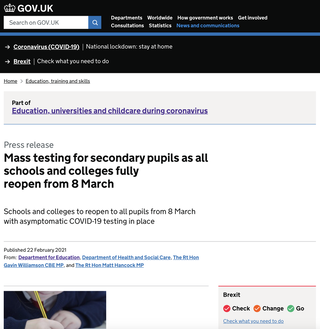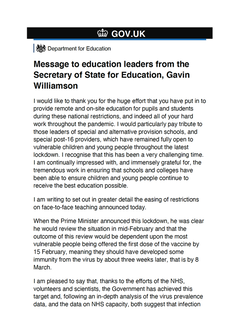|
Douglas Silas,
Specialist SEN Solicitor 1st March 2021
Too many people seem to not complete one thing before starting another...
Unfortunately, we have become overly fixated on the idea of multitasking, especially as smartphones/the internet have taken over more and more of our lives and constantly distract us. Once, we would start something and then finish it, before moving on to doing something else. However, too often I see people now (including myself) trying to start something else, before first completing the thing that we are doing. It doesn't take a genius to also work out that if you go on like this, you just end up with lots of things increasingly started but not yet completed. We are very good though at rationalising everything and convincing ourselves and others that we will be able to finish something off when we have more time - but the trouble is that we never then seem to be able to find more time! It's very dangerous also when we start to think like this, as the logical conclusion is that we just start amassing more and more jobs to finish, which then weigh us further and further down emotionally. We then feel more and more guilty about not doing them. This is especially the case if the things we need to finish off can be seen and then are staring us in the face to make us feel guilty. As people like to say: "out of sight, out of mind", but it really should be: "in sight, in mind!". So, it's really simple - just try and complete one thing before starting something else - you may find that doing things this way will then start to make life a bit easier for you.
In this week's SEN Update you will find information about:
I know how busy everyone always is, so please feel free just to read the sections that are of interest to you or read everything; the choice is always yours.
Don’t forget, to ensure that you never miss one, you can get my SEN Updates personally by completing your email details above,
or by following me on one of the social media platforms I use (i.e. Twitter/Facebook). You can also share this SEN Update with others (please only do so if it may be relevant to them) by using one of the icons, usually to the right or at the bottom of this page.
I'm starting to expect this now most weeks and have also noticed that it now seems to be getting later on a Friday (I hope this doesn't carry on like this, as most people will have already switched off for the weekend and may not see this information till the start of the next week).
At 6.45pm this time (I can't even call that late on Friday afternoon, as it is more like Friday evening), I received the latest email bulletin from the Department for Education's (DfE's) SEND Division, this week entitled: "***SEND Newsflash*** Announcements & publications during w/c 22 February ", which said: "Dear colleagues, It has been a busy week, and there is a lot to take in! We thought it would be helpful to draw together the various announcements and publications into one bumper newsflash for ease of reference:
- Actions for early years and childcare providers during the coronavirus (COVID-19) outbreak - Guidance for higher education providers - Coronavirus (COVID-19) contingency framework for education and childcare settings
- we published an Evidence summary: COVID-19 - children, young people and education settings - the Secretary of State wrote to education leaders setting out in more detail the plans to fully re-open schools. He also thanked leaders for their continued work and support during the latest lockdown. Leaders of special, special post-16 providers, and alternative provision schools were thanked in particular, for remaining fully open to children and young people with SEND.
- awarding qualifications in summer 2021 - making alternative arrangements for the award of VTQs and other general qualifications in 2021 Testing in specialist settings We have worked hard to give specialist settings additional flexibility on testing as attendance increases. For specialist settings this means:
A step-by-step guide to testing and frequently asked questions are available on the schools google drive. We will be publishing updated guidance on testing in specialist settings in the next week, the guidance will be published at https://www.gov.uk/government/publications/guidance-for-full-opening-special-schools-and-other-specialist-settings/mass-asymptomatic-testing-in-specialist-settings Many thanks Special Educational Needs and Disability Division" There is more, so I have split this into two parts this week...
...the email attached two things.
The first was entitled: "Message to education leaders from the Secretary of State for Education, Gavin Williamson" and said: "I would like to thank you for the huge effort that you have put in to provide remote and on-site education for pupils and students during these national restrictions, andindeed all of your hard work throughout the pandemic. I would particularly pay tribute to those leaders of special and alternative provision schools, and special post-16 providers, which have remained fully open to vulnerable children and young people throughout the latest lockdown. I recognise that this has been a verychallenging time. I am continually impressed with, and immensely grateful for, the tremendous work in ensuring that schools and colleges have been able to ensure children and young people continue to receive the best education possible. I am writing to set out in greater detail the easing of restrictions on face-to-faceteaching announced today. When the Prime Minister announced this lockdown, he was clear he would review the situation in mid-February and that the outcome of this review would be dependent upon the most vulnerable people being offered the first dose of the vaccine by 15 February, meaning they should have developed some immunity from the virus by about three weeks later, that is by 8 March. I am pleased to say that, thanks to the efforts of the NHS, volunteers and scientists, the Government has achieved this target and, following an in-depth analysis of the virus prevalence data, and the data on NHS capacity, both suggestthat infection rates have fallen across all ages, including in children and young people. Today, the Prime Minister set out the next phase of the Government’s response to coronavirus (COVID-19), including where restrictions on attendance at education settings can be lifted. The decision to ease restrictions is made on the balance of risk to public health and educational considerations. Return All schools, colleges and further education settings should allow full attendance from 8 March. Wraparound childcare, including childminders should also allow attendance for eligible children. School attendance will be mandatory for all pupils, with secondary schools and colleges able to phase return over the week of 8 March to allow students to be offered testing on return. The usual rules and duties around school attendance are in place from 8 March (including mandatory attendance). All schools should communicate expectations about regular attendance to pupils and parents. Schools should identify pupils at risk of disengagement and develop plans to re-engage them. Early years settings will continue to be open to all children, as they havethroughout the period of national restrictions. In further education settings, we expect that every 16 to 19 student (or 19 to 25 with an EHCP) will undertake the majority of their planned hours on site. For adults, as is best practice, further education providers should determine the appropriate balance of on-site and remote education and training, based on the type ofprogramme and the student’s ability to engage with the programme remotely. Higher education providers should recommence in-person teaching and learning from 8 March for students on practical or practice-based (including creative arts)courses who need access to specialist equipment and facilities. The Government will review, by the end of the Easter holidays, the options for timing of the return of remaining students. This review will take account of the latest data and will be a key part of the wider roadmap steps. Students and providers will be given a week’s notice ahead of anyfurther return. Based on the recent ONS data, the risks to education, childcare and HE staff aresimilar to those for most other occupations. Although the public health picture is improving, it remains crucial that steps are taken to reduce and mitigate any risks within education and childcare settings. DfE has worked closely with PHE to develop and refresh the system of controls to reduce the risk of transmission in education and childcare settings, based onscientific rationale. Rapid testingSince January, education leaders across schools, colleges and universities have been involved in a fantastic national effort to test their staff and students. Over 4 million tests have already been completed under your collective leadership and I would like to thank you for all the work you have done to set up the programme so far. Rapid testing will continue to remain a vital part of the Government’s plan to supress this virus, in education and childcare settings and across society. This sort of testing means that asymptomatic people who might otherwise continue to attend educational settings are identified and self-isolate. Twice-weekly asymptomatic testing is already available for secondary school, most college, primary school, special school, special post-16, school-based nursery and maintained nursery school workforce, including support staff such as teaching assistants and those supporting with wraparound childcare. Secondary schools and colleges have also been able to offer testing on return for their students, and we are now asking those leaders to put this in place for all students across the week of the 8 March as they return. Today, we have also announced the further expansion of this asymptomatic testing programme to include offering regular twice weekly testing of secondary school andcollege students at home, home based testing for secondary staff. Home testing willalso be available for Independent Training Providers and Adult and Community Learning Providers by the end of March. Rapid testing is already in place for those arriving or staying at university. We ask HE providers to offer two tests to all students eligible to attend their university or HE institution upon their return, and twice weekly asymptomatic testing to all students eligible to attend on-site, as well as providing testing for staff. All staff at private, voluntary and independent nurseries will have access to tests to use twice weekly at home, building on the testing already available to maintained nursery schools and school-based nurseries. Childminders can continue to accesscommunity testing, and the Department continues to work with colleagues across Government to review the testing approach available for childminders. Safety measures The return to on-site provision for all education, childcare and children’s social care settings will be supported by a range of actions designed to minimise the spread of coronavirus (COVID- 19). I know how hard you have all worked to implement thesemeasures and this continues to be vital. We have worked closely with PHE to develop and refresh the system of controls to reduce the risk of transmission in education and childcare settings, based on scientific rationale. The system of controls supports you to assess risk and implement measures to mitigate risk, including ventilating occupied spaces, introducing enhanced cleaning and retaining bubbles of students. We ask pupils, students and staff to continue to do everything they can to adhere to these measures, because it is vital that they are implemented well and consistently. In addition to the system of controls, where pupils in year 7 and above are educated, we recommend that face coverings should be worn by staff and pupils where social distancing cannot easily be maintained when moving around the premises outside of classrooms or teaching spaces, such as in corridors andcommunal areas. In the same settings for a limited period, we recommend the use of face coverings in classrooms and other teaching spaces, unless wearing a face covering would impact on the ability to take part in exercise or strenuous activity, for example in PE lessons, or for those who are exempt from wearing a face covering as set out in Government guidance. In primary schools and early years settings, face coverings should be worn by staff and adult visitors where social distancing between adults is not possible. Children in primary schools do not need to wear a face covering. Education recovery and qualifications I know you are completely aware that missing face-to-face education has severeimpacts for children and young people, with clear evidence that time out of face-to-face education is detrimental for cognitive and academic development, learning,health and wellbeing. That’s why the Government has been clear that restricting attendance in education settings was a last resort, and why education is being prioritised as we begin to ease restrictions. We will be setting out further measures for immediate support to children, early years settings, schools, colleges and local authorities later this week. I and Ofqual will also be setting out very soon further details of the alternative arrangements to exams. This follows the consultation which received over 100,000 responses, including from so many of you and your students. I am very pleased that we are able to return children and young people across England to their classrooms and colleges, to allow them to spend time with their friends and teachers and get back into the rhythms of the school or college year. Iwould like to thank you again for all the hard work you have done and continue to doto ensure that children and young people can return to face-to-face learning as smoothly as possible. The Rt Hon Gavin Williamson CBE MP Secretary of State for Education" The second attachment was entitled: 'Briefing Note for SEND stakeholders – Covid Recovery' and, in the interest of trying to keep this week's update shorter (it is already quite long as it is), although I'll include it here, please skip over it if it is of no interest to you...
The 'Briefing' said as follows:
"Briefing Note for SEND stakeholders – Covid Recovery As you will have seen, on 24 February, the government announced an additional £700m for a range of additional measures to give early years settings, schools, providers of 16-19 education – including specialist settings - and local authorities the tools they need to target support for all students. This builds on the £1 billion catch-up package announced in June 2020, and forms part of the wider response to help pupils make up their lost learning. Details of the package are set-out below. Recovery Premium A new one-off £302 million Recovery Premium for state primary and secondary schools will build on the Pupil Premium, to further support pupils who need it most. Schools have flexibility in how they choose to spend the premium. Primary schools will receive around £6,000 additional funding, and secondaries around £22,000 additional funding – bolstering summer provision for students. This funding can be used to lay onadditional clubs or activities or for other evidence-based approaches for supporting the mostdisadvantaged pupils, including those with special educational needs and disability (SEND), fromSeptember. The one-off Recovery Premium will be allocated to schools based on the same methodology as the pupil premium, including an additional weighting to specialist settings, recognising the significantly higher per pupil costs they face. Pupil premium eligible pupils in mainstream schools will attract £145 to their school and pupil premium eligible pupils in special schools, AP, hospital schools and special units in mainstream schools will attract £290 over the 2021/22 academic year. The Recovery Premium will be paid as a grant to all state-funded primary, secondary and special schoolsin England over the 2021/22 academic year. The timing of the payments will be confirmed shortly. Tutoring The announcement also confirmed £200 million (from the £300 million to expand successful tutoringprogrammes, announced by the Prime Minister in January), which will fund: An expansion of the National Tutoring Programme for primary and secondary schools, to allow more pupils to benefit from the power of regular tutoring which has been shown to boost catch-up learning by as much as 3-5 months. This will increase access to high-quality tuition for disadvantaged pupils, helping to accelerate their academic progress and tackling the attainmentgap between them and their peers. As with the current programme, we are committed to being as inclusive as possible by supplying suitable provision for supporting SEND pupils within all schools, including Special Schools. An extension of the 16-19 Tuition Fund for a further year to support more students in English, maths, and other vocational and academic subjects. Providers are asked to have regard to the needs of students with SEND when prioritising students that would benefit most for small group tuition. In line with usual 16-19 funding, children with SEND aged 19-24 who have an education, health and care plan will be eligible for the Tuition Fund where they meet the criteria. Adults are able to pause their learning where it has been significantly impacted by coronavirus and, in agreement with their provider, pick up from where they left off at a later date. Support for early language development in the early years, supporting a critical stage of childdevelopment. Summer Schools £200 million (including the final £100 million from the Prime Minister’s announcement) will be available to all secondary schools, including specialist settings, to deliver face-to-face summer schools. Schools will be able to target provision based on pupils’ needs but the government is suggesting they may want to initially target initially incoming year 7 pupils. This is alongside wider support funded through our Holiday Activities and Food Programme across the country. A range of high-quality online resources will be available for all teachers and pupils, starting from thesummer term and throughout summer holidays, will be provided by Oak National Academy, to help givepupils the confidence they are ready for the next academic year. The funding available for the summer schools programme supports a 2-week scheme for pupils most in need. The size and shape of the summer schools will be decided by school leaders who know best what a most effective summer school will look like for their pupils. We expect that most schools will want to offer a mix of academic, enrichment and pastoral activity to appeal to pupils and deliver the range of benefits that the evidence shows summer schools can deliver. Teachers will not be forced to do anything. Schools will need to determine how best to use the fundingand staff the scheme to ensure that the extra time is used effectively: teachers are best placed to deliver high quality educational content. Guidance will be published shortly. Next Steps Sir Kevan Collins has been appointed Education Recovery Commissioner to engage with parents, teachers, and education providers to review how evidence-based interventions can be used to address the impact the pandemic has had on learning. Sir Kevan will be advising the Secretary of State and thePrime Minister on a longer-term plan."
Finally, in terms of news, here's a few news articles that I found of interest:
Covid tests and masks: School prepares for return to class Summer catch-up schools planned for pupils in England Doctors fear new child mental health crisis in UK, made worse by Covid Vulnerable children 'forgotten' in Covid vaccine rollout, say UK charities
Where can I find further information?
Again, aside from clicking on the relevant links for more information, I would also remind you of the very useful resources and information provided on the following websites: - IPSEA - Council for Disabled Children - Contact - Scope - Special Needs Jungle I would also highlight again the fact that you can now get digital copies of the magazines: SEN Magazine and Autism Eye which are both very helpful to any parents or professionals involved with children/young people with SEN. Keep safe until next week. With best wishes Douglas
P.S I understand that there are a number of educational or other useful resources now on the web, so I would be very grateful if you could let me know of any that you find that other people may find useful, so that I can direct people to it.
How useful do you find my SEN Updates?
Created with Quiz Maker
Comments are closed.
|
Archive
March 2022
|
© Douglas Silas Solicitors 2005-24
Authorised and Regulated by the Solicitors Regulation Authority (SRA no: 643718)
‘Douglas Silas Solicitors’ is the trading name of ‘Douglas Silas Solicitors Limited’, a limited company registered in England & Wales (company no: 10689991), whose registered office is Gable House, 239 Regents Park Road, Finchley, London, United Kingdom, N3 3LF. A list of members/directors may be inspected at our office.
Authorised and Regulated by the Solicitors Regulation Authority (SRA no: 643718)
‘Douglas Silas Solicitors’ is the trading name of ‘Douglas Silas Solicitors Limited’, a limited company registered in England & Wales (company no: 10689991), whose registered office is Gable House, 239 Regents Park Road, Finchley, London, United Kingdom, N3 3LF. A list of members/directors may be inspected at our office.






 RSS Feed
RSS Feed







